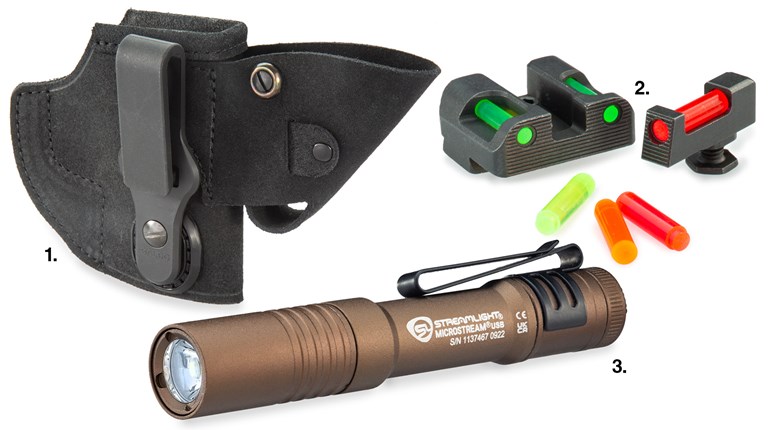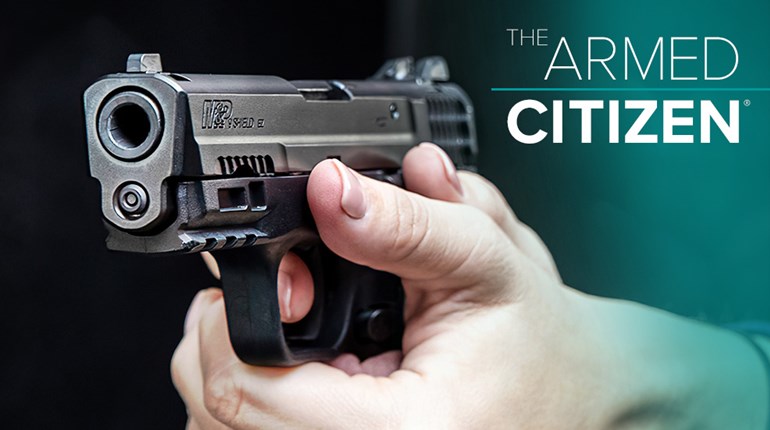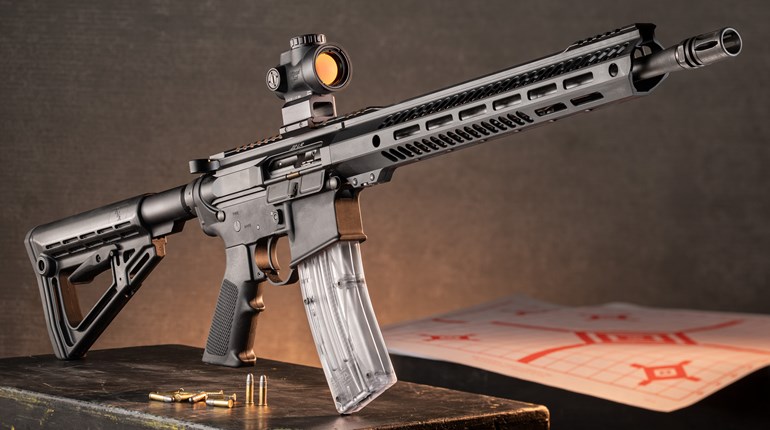
We’re never happy about answers that begin with “That depends...” While it is a pre-fabricated excuse to hear ourselves yap—and who doesn’t enjoy that, now and again—it too easily smacks of a pretense to more knowledge than modesty or caution would advise anyone to claim. Under the (loud) admonition of our better angels, we’d rather listen and learn.
Still, it’s as close to a guiltless pleasure as we can easily find to be of actual use to fellow shooters. In this spirit we tap our list of most-common questions, and spend a First Gear on pistol sights.
So what is the best (conventional) pistol sight?
Wait for it…
…Well, that depends.
Predominantly Defensive

Few will be surprised at our nominee here, even if only by a whisker—the Trijicon HD. Legendary toughness is either the result of or reason for decades of law enforcement and military application, and willing throngs of knowledgeable, serious civilians quite obviously don’t care which.
The front blade of the HDs always reminds us of British actor Desmond Llewelyn. As the Quartermaster “Q” in 1971’s “Diamonds Are Forever,” (and 16 other Bond films) he opines over some masterful gadget, “Oh, an obvious little notion.” Well, a tritium lamp centered in a bright orange (or green/yellow) surround on the front post strikes us the same way—great visibility day or night. The result is an apparently huge, fast dot, but don’t mistake “big” for “imprecise.”

The rear is a perfect compliment, with a U-shaped notch that practically vacuums the dot into alignment. The result is uncommon speed while the sun shines. But discretely housed in the distinctive, slope-sided rear are two more tritium lamps, nicely obfuscated so that you have to search them out to be distracted by day (it just doesn’t happen), yet by night a three dot configuration with an obviously brighter center/front yields low-light precision second only to night vision.
With design and material details that read like a high-end bank vault and 12-year lamp life, these cost a little more than some other get-ups. But shoot them as we have, and we think you’ll agree they’re worth every penny.
Ummmmmmmmmm
There’s no shame in not knowing precisely what you need. This is particularly so if you have a new pistol, or are adapting to a new role for an existing one. The bigger mistake here (read “more” or “much more” costly) is galloping off on a path described by narrow criteria, and ending up with something that doesn’t result in a clear direction, much less a sound choice. This happens for one of two reasons—either because your selection does nothing particularly well, or because it does only one thing well. Sight karma warning in this latter case: That “one thing” has about a one-in-50 chance of being remotely useful or interesting to you.

Our default here is a no-brainer—the TruGlo TFO. These are tritium-enabled dandies that put a low-light 3H lamp behind the fiber optic, the big payoff being identical presentation in all light conditions. There are always three green dots (or green front/yellow rear) whenever you take a sight picture.
We recommend these especially for already-competent shooters who are considering a move from the sporting stage into competition or serious carry/defense. They permit the development of good technique and habits—like tracking the sights all the way through recoil—but don’t embed any foibles you’ll pay for down the road.
You can stay with TFOs (or the newer TFXs) for a long time and never have reason to regret it.
Game On!
We think everybody should compete, at least a little. Mainly, this has to do with breaking down an artifact of lane-style practice: “I can make a perfect shot when I wish,” in a world that may demand an “acceptable shot when I must.” Since the stresses of an actual engagement are impossible to simulate, we must proxy them; time pressure is imperfect in this regard, but much better than nothing.

The tick-tock of competition puts sight picture in a predictable crucible: It’s hard to shoot with precision and speed if you can’t see those sights, and especially if you can’t track them in recoil. Human vision being what it is, for most this means color, and other uses—like low-light visibility—may fade in importance.
Shooters experimented with paints, patterns and geometries for years—actually, generations—and modern materials have coalesced around small variations on one solution: a rugged, precision-machined steel “notch and post” (or Patridge), augmented by a fiber optic in the front to collect available light and beam it back at the shooter. While you still see other types now and again, the circles we run in have fewer than 10 percent using all those other types combined.
This near unanimity of opinion makes recommendations difficult too, mainly because differences are sometimes razor thin. But if you’re looking for a short cut, i.e. advice, we think it’s tough to improve on either Dawson Precision or Warren Tactical.
We’ve often lauded the Dawsons: They are available for a huge variety of pistols, have withstood the rigors of long, hard use, and offer fine-tuning of your sight picture to a degree that borders on astonishing. As we mentioned here, they’ll even make you a front sight to get your firearm hitting where and as you expect, though we’ve never had to resort to this. Granted, you still have to press the trigger correctly, but otherwise, wow—that’s customer service. They’re available for most pistols in a variety of heights and widths, and in “fixed” and “adjustable” configs, so beware—room for excuses gets scant in a hurry.

Our recommendation for Warren Tactical is similarly enthusiastic, though accompanied by a caveat you’ll recognize. We’re hesitant to say that why we like them will apply to everyone else. Be that as it may, our favorite is here; both the “waveform” and “U” notch are extremely effective in exciting the brain’s concentricity bias, and thereby make alignment extremely rapid. In our (added) defense, these are everywhere among top-level competitive shooters, as well as in law enforcement (Scott Warren’s home ground—FBI HRT) and military circles. Mighty good stuff, period.
A word of caution about sight selection in general befits our close: If you possibly can, always shoot a pistol similar to your own fitted with the sights you’re thinking about. If this elicits a “well, duh,” fine. But the point here isn’t a trivial one despite being a simple, even obvious, neuro-optical truth: Different brain and eyes “build” sight picture in different ways. This means that what works perfectly for one chap may prove a subtle but pervasive disaster for the next. Finding the perfect set-up can be very costly, and that’s the trouble we’ve angled to spare you.
Our own competitive “A” pistol—the designation meaning our default, go-to, maximum confidence rig—has worn all of these, and may again. Right now, however, it sports a mix that solves a very particular sight picture problem that vexed us.
So while we think our foursome is a fine one, it doesn’t mean there aren’t other excellent choices indeed, even ones we presently use. BattleHook (a super low-to-the-bore, über tough sight that also maximizes sight radius), Ameriglo (really precise, sharply defined dots) and HiViz (fiber replacement second to none) are just three more examples that make the grade with ease.
More than anything, don’t be in too big a hurry.

































